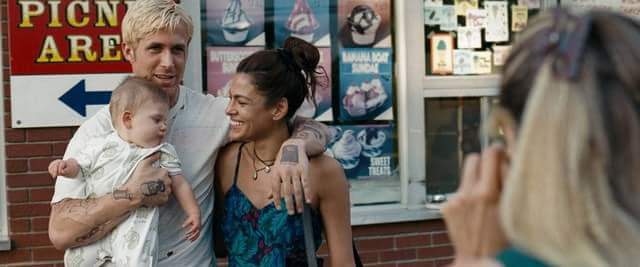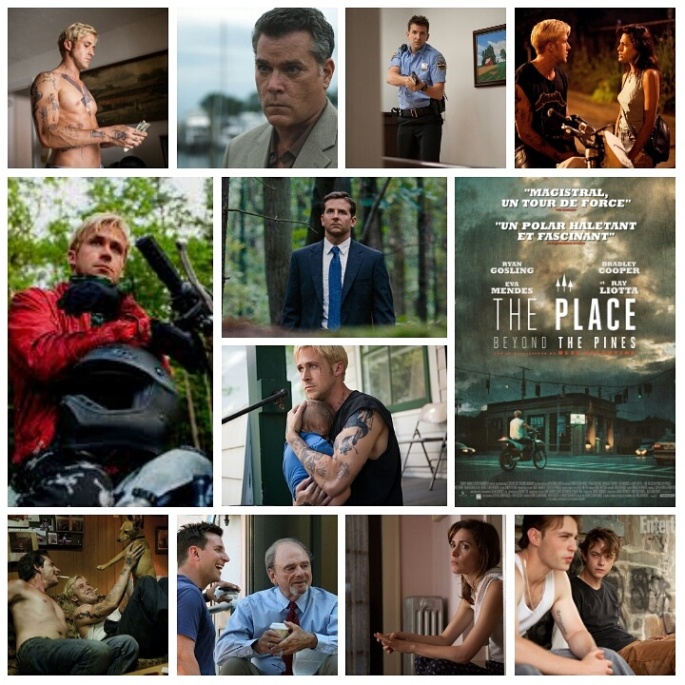As the opening title, “A film by Derek Cianfrance”, dissipates, a breath is drawn followed by the clinking of an angel knife as Ryan Gosling’s Luke Glanton menacingly opens and closes it, his abs glowing in the dimly lit room, his body battered with tattoos as the sounds of people, rides and games emit from outside his small trailer. He’s told it’s showtime by an outside authority, jamming the knife overhand into a wall before picking up his shirt and red jacket and slipping out the door, putting them both on as he traverses the crowd until he reaches a large tent boasting The Globe Of Death. He walks with the swagger of James Dean as he enters the tent to cheers and cries of excitement from fans alike as he and two fellow riders known only as The Heart Throbs gear up on their motorcycles and glide into the deadly spherical cage. Engines roar and fans scream as Handsome Luke and The Heart Throbs dizzyingly ride their motorcycles loop de loop until the screen fades to Luke signing autographs. And to think, that was all done in one take.
The Place Beyond The Pines is a beautifully brooding, tragic, heartbreakingly powerful, and ambitious genre film about fathers and sons, legacy, and consequences. Luke Glanton (Gosling), a daredevil carnival motorcycle rider finds out former fling Romina (Eva Mendes), a local waitress and fan of Luke’s skills, recently had their son, Jason after their last fling. Much to her surprise, he quits his job in the hopes that he can concoct a relationship with the infant and her too, even though she has a new, responsible man in her life by the name of Kofi (Mahershala Ali, in an understated role).
Luke is irresponsible, impulsive, tattooed all to hell and prone to outbursts of violence. Things only get complicated once he meets Robin Van Der Zee (Ben Mendelsohn), a grubby mechanic who hires him after witnessing his outstanding skills on the motorcycle. He suggests that Luke rob banks, Robin himself having robbed banks years earlier, and Luke, in need of quick cash to support his son, opts to do just that. As time marches on the risks get higher and the cash comes thicker during riveting, manic heists and intense and stunningly realistic getaways; until Robin suddenly balks, leaving Luke to sloppily rob a bank and subsequently get chased across town on his motorcycle. The breathtaking chase leads Luke to a violent confrontation with Avery Cross (Bradley Cooper), a young police officer and son of a well respected judge.
After his confrontation with Luke, Avery begins to question his actions during the encounter as fellow officers headed by Pete Deluca (the always intimidating Ray Liotta, in full-on bad cop mode) engage in thuggish, corrupt behaviour which begins to take its toll on Avery and his family life as the father to a newborn son and husband to a fearful wife.
Skip ahead 15 years and Avery is running for public office, as his and Luke’s respective sons Jason (Dane DeHaan) and A.J. (Emory Cohen) begin a tumultuous and troubling friendship. I have to stop there, as any more details about the film will surely spoil what is undoubtedly a surprising film.
Luke’s story takes up the first 45-60 minutes, and is the best of the three stories in this triptych film; a deep, emotional roller-coaster that follows Luke as he struggles to provide for his newborn son. The heists are crisp, increasingly sloppy and volatile, brimming with an underlying intensity and fiery rawness. When he robs, he angrily squeals and shrieks his commands, grabbing the closest person to him as leverage until he has the money. When he rides, it’s as if you’re right there with him; the roar of the engine thundering through the air as he speeds down twisting roads into Robin’s cube truck.
Ryan Gosling as the violent, troubled Luke Glanton is mesmerizing, delivering his best performance since 2010’s Blue Valentine (which marked his first collaboration with this film’s director Derek Cianfrance), and surely one for the Oscar nomination list. He doesn’t say much which draws comparison to his eerie role as The Driver in 2011’s Drive, his eyes and facial expressions exuding Luke’s restrained and ominous personality in the same brooding manner as he did in Drive. He also has a vehicular skill, this time motorcycles and not cars, but that’s about where the comparisons stop. Where Driver felt like a caricature, or a fantastical vigilante ripped from a ludicrous dream, Luke feels, and very much so is, a genuine, authentic and honest portrayal of a man struggling to leave a strong imprint in his son’s life while dealing with his own inner, violent demons. He holds honest intentions, but is far too explosive and violent for the life he quietly yearns for.
Eva Mendes is at her quiet best here as Romina, giving an heartfelt and touching portrayal of a mother trying to do what’s right for her son, which may or may not always be the best of decisions. Ben Mendelsohn (of Animal Kingdom, The Dark Knight Rises and Killing Them Softly fame) yet again find a rhythm for playing the greasy, twitchy mechanic and Luke’s only friend Robin. His ability to slip into these scuzzy roles is fantastic, as he once again delivers a magnetic performance.
The second story that follows Avery post-Luke encounter runs for about the same length as the first section, as does the last section. The film seamlessly weaves between the sections, pausing only for a moment with a black screen as if to let us breathe before it catapults us into Avery’s battle for survival in the world of policing. The story presents itself much like a cop film from the ‘70’s, something the likes of William Friedkin or Francis Ford Coppola would have sunk their teeth deep into. Bradley Cooper is fantastic in this act, quickly taking the reins of the film as the torch gets passed along, proving once again that most audiences have underestimated his acting prowess in the past despite the complexity of his most recent roles. Ray Liotta as Pete Deluca, a corrupt veteran officer, is at his menacing best, and Rose Byrne (Jennifer, Avery’s wife), Harris Yulin (as Avery’s judge father Al) and Bruce Greenwood as slippery lawyer Bill Killcullen all deliver with quiet, small roles with actions that echo a lifetime.
I won’t go too deep into the final act, but I will say that Dane DeHaan is one to watch, one-upping his co-star Emory Cohen as Luke’s estranged son Jason, matching pound for pound the intensity delivered by the more seasoned actors in the film. Emory is convincing as the drug-addled interpretation of MTV styled behaviour infused into Avery’s son A.J.
The latter two stories following Avery post-confrontation, and later their respective sons, are thoroughly engaging, edgy and potent, but are intentionally not as electrifying as Luke’s daredevil lifestyle portion of the film. Luke’s story is one electric scene after another, each as haunting and memorable as the last until his story ends, when the film slows down to give us a deep insight into the lives of police officers and their family, and the ramifications of the violence and corrupt actions committed in the first story; each scene for the 140 minute running time never failing to captivate your eyes and mind. Despite how well acted the last two chapters of the film are, one can’t help but feel underwhelmed by them both after the volatile, quick paced first act.
This is a powerhouse, haunting, Shakespeare-esque cinematic experience of a lifetime. Derek Cianfrance, the director behind Blue Valentine and the largely unseen Brother Tied gives us his best film here, an honest tale of fathers and sons, violence and its impacts, actions and their consequences. He gets the absolute most of of his actors, no matter how big or small the role, with relative ease it seems. As stated in several dozen interviews, many of the scenes are genuine, featuring real actions from his actors during rehearsals, or spontaneous behaviours from them as filing was occurring, which helps push the realistic, honest and authentic nature of this film to greater heights. The violence is quick and bloody, but never stylized or gimmicky, instead remaining true to the speed and ferocity of real violence one would see in a Sunday night instalment of World’s Wildest Police Chases, which Derek himself said inspired the realism of this film. Mike Patton’s thrilling score greatly enhances each scene, never becoming overbearing or underused.
While Blue Valentine was a small scaled romantic tragedy, The Place Beyond The Pines is on a much larger playing field as it spans its 15 plus years, giving us a sweeping genre epic that stands an equal among similar father-son consequential films such as The Godfather. Derek Cianfrance once again shows us he’s a masterclass in filmmaking, delivering what will surely be the year’s best dramatic film. This is filmmaking from the pelvis by Cianfrance that grabs you by the throat and never lets go until the final, heartbreaking frames contrasted with Bon Iver’s ‘The Wolves’; this, is one hell of a film, and among the best of its year of release. As this epic tale of fathers, sons, and consequences rides off into the morning sunrise, its grip will loosen just enough to leave you breathless in its powerful wake.


 Podcasting Them Softly is honored and extremely excited to present a discussion with feature film editor
Podcasting Them Softly is honored and extremely excited to present a discussion with feature film editor 
